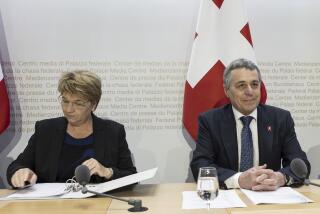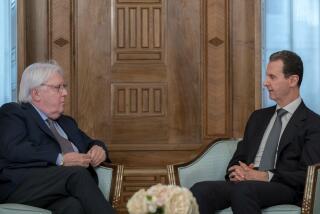Arab League’s Fate May Rest With Summit
CASABLANCA, Morocco — Arab leaders arrived here Tuesday for a crucial summit whose outcome has been thrown into doubt by failure to agree on an agenda and pessimism about the viability of the Arab League.
“This meeting is very important,” Moroccan Foreign Minister Abdellatif Filali told foreign reporters. “If it fails, then the Arab League may be finished.”
Morocco’s King Hassan II called the Arab League summit, the first in three years, to try to bridge the widening rift in the Arab world between moderate states that favor peace negotiations with Israel and radicals that oppose them.
‘Purify Atmosphere’
But so far, Hassan’s attempt to bring both sides together to “purify the Arab atmosphere” has only underscored Arab disunity and widened the divisions--to the point where some summit participants openly wonder whether the 40-year-old Arab League can continue to exist.
“The big question at this summit,” said Omani Foreign Ministry official Youssef Alawi, “is whether it will be the last summit of the Arab League. I personally think it will be.”
The Casablanca summit has been at the center of a storm of controversy since it was called over the strong objections of Arab radicals.
Daunted by a Syrian-led boycott, only 17 of the league’s 21 members are attending. Of those, only 10 are being represented by their leaders or heads of state: Jordan, Bahrain, Qatar, the United Arab Emirates, Sudan, Somalia, Djibouti, Mauritania, host Morocco and the Palestine Liberation Organization.
Various Excuses
“The others have all given various excuses for not sending their leaders,” said a Palestinian diplomat.
“The absence of so many heads of state is a clear indication of the fact that there are so many differences between us,” added Alawi, whose nation’s own leader, Sultan Kaboos ibn Said, said he could not come because he was not well.
Preparations for the summit got off to a rocky start when a two-day foreign ministers’ meeting, called to set the agenda for the heads of state, ended in apparent failure Tuesday after the first day.
“The foreign ministers were not able to agree on an agenda,” said one of the participants. “There were too many differences.”
Heated Argument
Conference sources said Iraqi Foreign Minister Tarik Aziz got into a heated argument with Ahmed Shahati, the leader of the Libyan delegation, when the latter tried to put an item on the summit agenda condemning Jordan and Iraq for re-establishing ties with Egypt. Egypt was expelled from the Arab League in 1979 after it signed a peace treaty with Israel.
The Libyans also demanded passage of resolutions calling for an Arab boycott of the United States and a condemnation of Arab countries participating in current military maneuvers with the United States--a move aimed primarily at Egypt.
The Libyan resolutions were shelved after a heated debate. Then Shahati, a mid-level Foreign Ministry official who achieved notoriety for his business dealings with former President Jimmy Carter’s brother Billy in the 1970s, abruptly left for home.
Morocco’s Filali said that contacts were under way with the Libyans and that there was a “possibility that someone from Libya will arrive” today to represent them. Another late arrival, he said, may be Iraqi President Saddam Hussein, who reportedly wants to attend but is preoccupied with events at home.
Consensus on Issues
The pre-summit squabbles have given rise to expectations of failure, even though most countries coming to Casablanca seem to share a consensus on a number of issues.
The most important of these is the agreement reached last February between Jordan’s King Hussein and PLO Chairman Yasser Arafat on a joint approach to Middle East peace talks.
When Hassan raised the idea of a summit last month, Hussein and Arafat saw it as an opportunity to win Arab backing for their peace initiative, which envisions talks with the United States first and negotiations with Israel later at an international conference.
But while the issue will still be discussed, Hussein and Arafat have now decided not to raise it formally at the conference, diplomatic sources said.
Syria Dominates
The change of strategy reflects Syria’s domination of the summit--and its opposition to the Jordanian peace plan--even though it is not attending.
More to Read
Sign up for Essential California
The most important California stories and recommendations in your inbox every morning.
You may occasionally receive promotional content from the Los Angeles Times.










